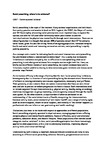Social prescribing: where is the evidence? Commissioned editorial
Date
2019-01Author
Subject
Metadata
Show full item recordAbstract
Social prescribing is the topic of the moment. Many national organisations and individuals from policy, practice, and academia (such as NHS England, the RCGP, the Mayor of London, and National Institute for Health Research) are rightly advocating social prescriptions as an important way to expand the options available for GPs and other community-based practitioners to provide individualised care for people’s physical and mental health through social interventions. No robust figures exist but it is thought that around 20% of patients consult their GP for primarily social issues, given this and the driving forces of an ageing population, increased complex health and social needs, and increasing demand on services, social prescribing is rapidly gaining popularity.As a concept and a model for delivering health and social interventions, social prescribing has proliferated without a concomitant evidence base.1 This is partly due to resource limitations on evaluators and partly due to difficulties in conceptualising what social prescribing is and what good evidence for a complex service might look like. Here, we briefly outline different models of social prescribing, the current evidence base and its limitations, explore problems relating to what constitutes good evidence, and discuss some potential ways forward.An immediate difficulty is the range of activity that the term ‘social prescribing’ embraces. Such heterogeneity is a function of social prescribing being the demand-driven formalisation of referrals to existing community services and organisations, which is necessarily locally different. More generally, at one extreme there are narrow interventions that focus on one clinical area and aim to prevent or reduce progression to chronic disease. Such interventions tend to include targeted life-style interventions (for example physical activity, healthy eating or cooking), medicines management or group mentoring, and are typically accessed through the healthcare system. At the other extreme, a large number of schemes are …
Collections
Publisher
Place of Publication
Journal
Volume
Issue
Pagination
Author URL
Recommended, similar items
The following license files are associated with this item:


